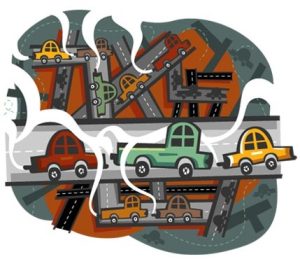Is there anything more annoying than not being able to get to your own front gate because legions of inconsiderate parents on the school run have grid-locked the neighbourhood?
At least that was what I was telling myself as I arrived at my uncle’s sheltered housing to find all the private parking – including two blue badge spaces – occupied by cars the size of small cottages.
I was there to meet a man with a van: social services had arranged to deliver an electric bed – which would hopefully allow my uncle to retain what little independence he had a tad longer.
But the melee outside – and the realisation I’d no hope of parking in my usual visitor spot – sent my thoughts spiralling into overdrive. The delivery could come any time: what would the driver do? How could he get the bed to my uncle? Might he turn around and go away again? Should I plead with the illegal parkers to make sure there was space for the delivery vehicle?
The anger grew inside me like a ball of fiery indigestion. My body tensed, coiled for the fight I knew would follow if I began remonstrating with the parent parkers.
The danger of telling ourselves stories
 Here I was, at nine in the morning, getting furious and stressed about something that might happen at some point.
Here I was, at nine in the morning, getting furious and stressed about something that might happen at some point.
All I actually knew about the delivery was that it would happen sometime during the day. It might or might not coincide with the school run, and if it did, someone might still be parked in the disabled bays – or they might not.
If they were, the delivery driver could talk to them. It was his business to drop off the bed; not mine.
So why the heck was I getting worked up and feeling awful about something that only existed in my mind?
I realised I too had been a bad parker
Once I noticed what I was doing to myself and took a step back to observe rather than believe my thoughts, I remembered something else: myself as a harassed single parent, trying to juggle job, caring responsibilities and two school age children. And no doubt parking wherever I could…
Those parents sweating in the front seats of their cars might be suffering from a lack of awareness and empathy – or they might be stressed to the eyeballs and doing their best to juggle more balls than I could even imagine.
it pays to mind your mind
On this occasion, those two new thoughts – look how I’m making myself feel bad and perhaps those pesky parkers are also feeling bad – was all it took to dial down the stress and rage that had been making me feel physically sick.
It made me ask myself how often I let the stories in my mind run rampant, and cause myself suffering as a result. As Michael Neill points out so beautifully: “Just because you have a thought in your head….doesn’t mean you have to believe it.”
Living softly means noticing when our thoughts are running out of control; Louise Hay calls it ‘awfulising’. It means quietly asking ourselves whether the stories in our head are true, or whether we could choose a different thought, or a different attitude.
a happy ending
Another living softly principle is to ‘make space for grace’: in other words, stop trying to control everything. It’s remarkable how often, when we do so and take a step back, things work themselves out. Half an hour after my meltdown – and calm-down – the delivery man called, the bed was delivered, and I got back to work.


